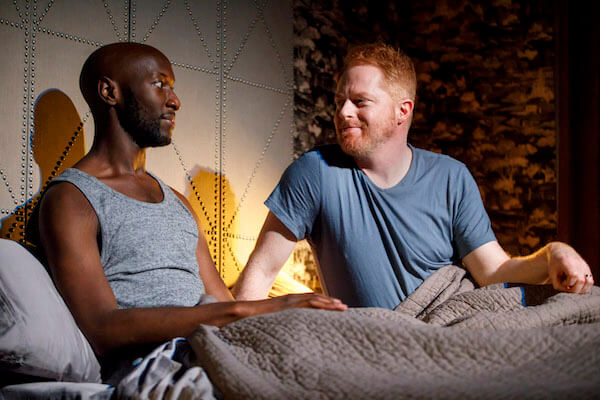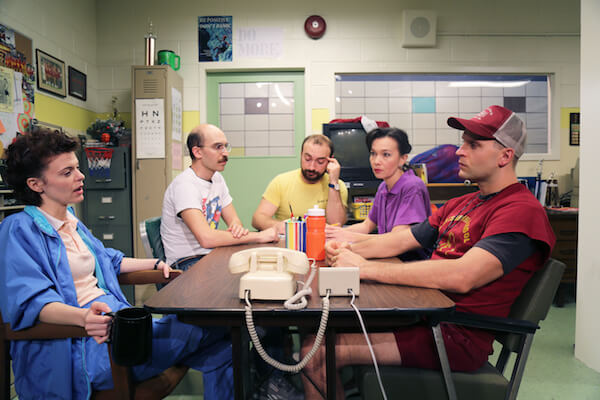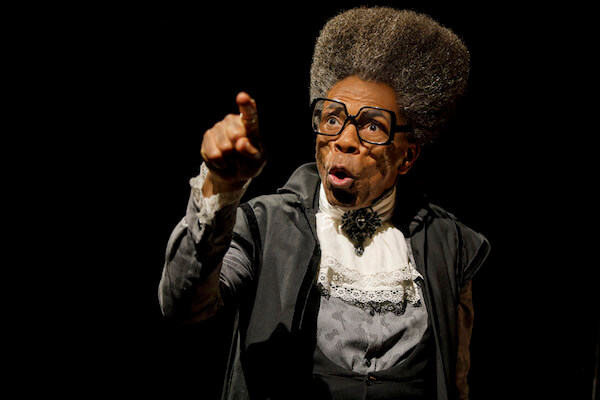Stephen Park and Tim Kang in Julia Cho’s “Aubergine,” directed by Kate Whoriskey, at Playwrights Horizons through October 2. | JOAN MARCUS
BY DAVID KENNERLEY | A man lies dying in a hospital-style bed center stage for the better part of “Aubergine,” a heartfelt, multicultural play by Julia Cho at Playwrights Horizons. But Cho has crafted the deeply touching drama so brilliantly that it’s more a celebration of life than a lamentation of loss.
And what better way to symbolize life than with food, and plenty of it.
The play’s title is a tipoff, for aubergine refers to what the French and the Brits call the lowly eggplant.
“Aubergine is so much more beautiful,” one character says. “Call them aubergine and they taste better.”
As Cho sees it, food is infinitely more than nourishment for the body — it’s also sustenance for the soul. Food is culture, family, and love. Food can be a unifier; sometimes, it says what words cannot say.
An exquisite, multicultural meditation on mortality, family, and sustenance
The choppy narrative, mostly set in a present-day American suburb, skips across time and place. Characters are prone to recounting vibrant stories directly to the audience and occasionally break out into song.
First we meet Diane (Jessica Love), a wealthy American food tourist who recalls “gastronomic gallivanting” with her hubby in search of divine pheasant creations and cheese made from unpasteurized milk.
Next is Ray (Tim Kang), an up-and-coming chef whose father lies in hospice at home, suffering from end stage liver cirrhosis. Although his father is Korean, Ray was born in America. His mother died in an accident long ago. He concocts an elaborate, savory turtle soup for his ailing father (Stephen Park), but it goes uneaten.
Ray’s on again, off again girlfriend Cornelia (Sue Jean Kim), born in Korea but raised mostly in America, recounts growing up with four refrigerators.
“My mother was obsessed with food,” she says. “Or I should say, obsessed with feeding people. Namely us, her family.”
Cornelia rebelled as an adult by subsisting on peanut butter and crackers and other ultra-processed foods.
Lucien (Michael Potts), the father’s nurse, is a refugee who once lived in a horrific tent city camp, dreaming of the rich meat-and-vegetable stews his relatives once made.
When Ray’s estranged uncle (Joseph Steven Yang) from Korea comes on the scene, things get even more complicated. He speaks no English.
Director Kate Whoriskey elicits fine performances from the talented ensemble (Kang, of the hit CBS series “The Mentalist,” is superb). She does her best to join the disparate elements into a cohesive whole, though there are a few gaps. Integrating the patches of Korean dialogue (English supertitles appear on a wall) is not entirely successful. Ray speaks little Korean, yet somehow he understands what his uncle is saying. Is he reading the supertitles as well?
What’s more, there are a couple of awkward scenes late in the second act that feel like false endings and could use some finessing. When Diane finally returns after being inexplicably absent for most of the proceedings, however, it’s worth the wait.
Despite the preoccupation with cuisine, detailing dishes like “seared Nantucket Bay scallops with lemon and verbena and sorrel,” “Aubergine” is no excursion for extravagant foodies. In fact, it’s just the opposite.
Turns out the most sublime food is the simplest. For Diane, it’s her father’s peppery pastrami sandwiches, fried in browned butter. For Cornelia, it’s a bowl of soft, sweet mulberries, the kind she ate fresh off the tree as a child. For Lucien, it’s tiny, garden-fresh okra that reminds him of home. Ray’s father prefers the cheap blocks of ramen noodles over his son’s lavish cuisine.
How wonderful that his father is brought to spend his final days at home (Derek McLane designed the appealing set) rather than some impersonal hospital. And how fitting that, instead of being crammed into a bedroom, his bed is placed in the dining room, right beside the kitchen.
AUBERGINE | Playwrights Horizons, 416 W. 42nd St. | Through Oct. 2: Tue.-Wed. at 7 p.m.; Thu.-Sat. at 8 p.m.; Sat.-Sun. at 2:30 p.m.; Sun. at 7:30 p.m. | $75-$90 at playwrightshorizons.org | Two hrs.,10 mins., with intermission


































